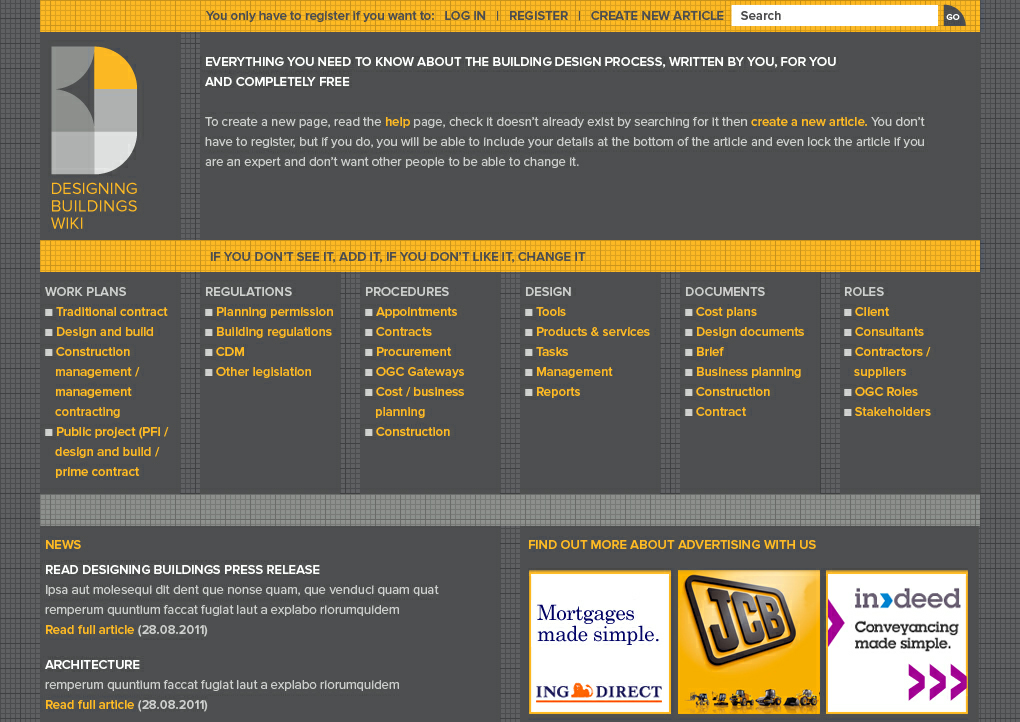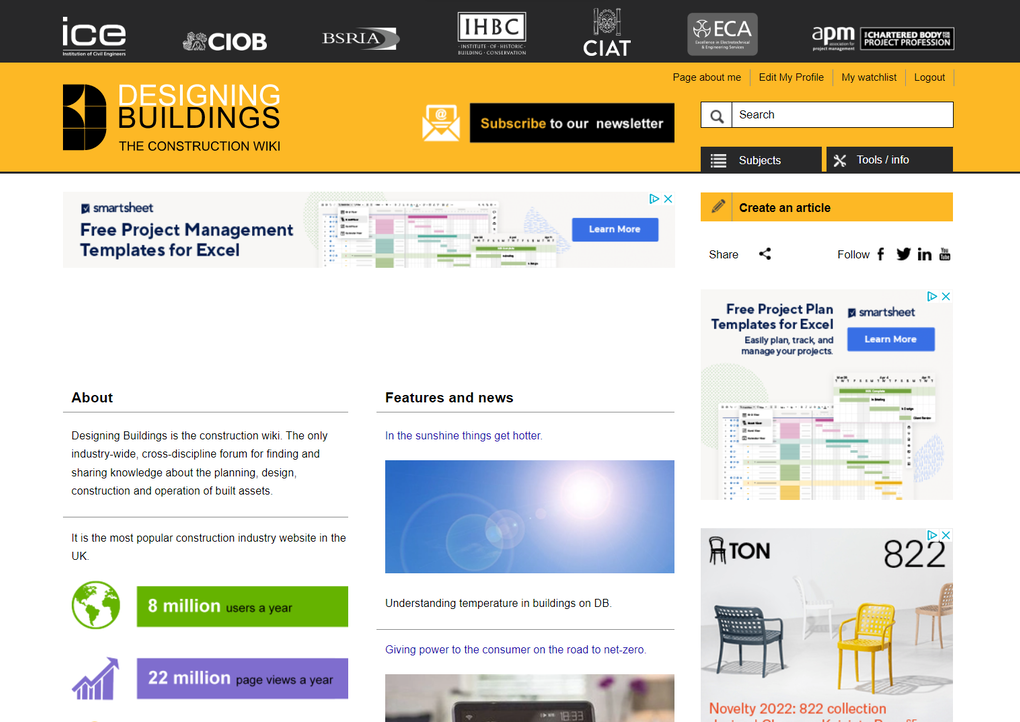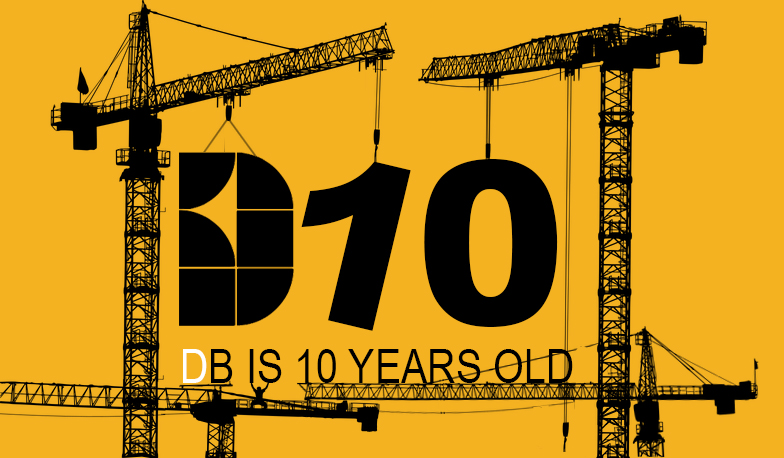10 years of Designing Buildings

|

|
| 2012 | 2022 |
Contents |
What we set out to do
Designing Buildings, the construction industry wiki, was launched on 22 June 2012 with one simple vision:
| Put construction industry knowledge in one place and make it available to everyone free. |
This was a response to the well-known lack of dissemination of knowledge in the construction industry which has resulted in the repetition of errors, low productivity and low efficiency, poor uptake of research and innovations, and inconsistent adoption of best practice.
The random scattering of construction knowledge on a plethora of industry websites has also resulted in a huge duplication of effort, and exacerbated a silo mentality. As a result, there has been a lack of collaboration and poor understanding between different parts of the industry.
David Trench, Gregor Harvie, Richard Winward and Martin Cantor decided to do something about it, and on 22 June 2012 Designing Buildings was born - a free, open access wiki site for the construction industry allowing practitioners to share knowledge about things they know and find knowledge about things they don’t.
What we have achieved
- Since 2012, 14,500 articles have been added to the site about the planning, design, construction, operation and decommissioning of built assets.
- Designing Buildings has been used by 43 million people from every part of the industry and from every part of the world.
- This has generated 118 million page views.
Each one of those page views is a lesson learned, a mistake avoided, or an opportunity found.
Why construction knowledge matters
Construction knowledge creates the context for the industry. It creates a vital supporting framework that defines what is required from us and describes what is possible. It allows us to maintain our competence and ensure compliance. Without it, opportunities are missed, research and innovations are not adopted and known errors are repeated.
|
|
There is still a very long way to go
Only a fraction of construction industry knowledge is available on Designing Buildings. The rest remains in archives, on desk tops and scattered across the internet. These Individual pieces of knowledge are standalone, isolated documents - not integrated or interoperable with any other industry knowledge, and not integrated or interoperable with project data or project information.
Construction knowledge is also still largely in the form of pdfs that are designed to be printed out and put on a shelf. This is the equivalent of CAD in the 1990’s, before the introduction of BIM, when CAD drawings were simply dumb digital versions of paper drawings. In 2022, most industry knowledge is still in the form of dumb digital versions of paper documents.
| Construction knowledge remains 30 years behind BIM - essentially one step on from the printing press. |
Knowledge has been left behind in the modernisation of the construction industry. Information has been modernised, digitised, standardised and made interoperable by the introduction of BIM, and the same is now happening to data with the development of analytics, the internet of things and digital twins. But knowledge remains out of the loop - a blind spot for the industry.
We will keep working to improve industry knowledge
Designing Buildings will continue to offer a free platform for knowledge sharing across the industry. We will continue to seek content providers that will partner with us to improve access to their knowledge and we will continue to advocate for more collaborative creation and dissemination of knowledge.
Through our work chairing the Construction Knowledge Task Group we will raise the profile of construction knowledge and push it up the agenda for change. We will seek high-level support to begin to redress the imbalance between knowledge, data and information, and will strive to make all three equivalent, integrated and interoperable.
Related articles on Designing Buildings
Featured articles and news
Apprenticeships and the responsibility we share
Perspectives from the CIOB President as National Apprentice Week comes to a close.
The first line of defence against rain, wind and snow.
Building Safety recap January, 2026
What we missed at the end of last year, and at the start of this...
National Apprenticeship Week 2026, 9-15 Feb
Shining a light on the positive impacts for businesses, their apprentices and the wider economy alike.
Applications and benefits of acoustic flooring
From commercial to retail.
From solid to sprung and ribbed to raised.
Strengthening industry collaboration in Hong Kong
Hong Kong Institute of Construction and The Chartered Institute of Building sign Memorandum of Understanding.
A detailed description from the experts at Cornish Lime.
IHBC planning for growth with corporate plan development
Grow with the Institute by volunteering and CP25 consultation.
Connecting ambition and action for designers and specifiers.
Electrical skills gap deepens as apprenticeship starts fall despite surging demand says ECA.
Built environment bodies deepen joint action on EDI
B.E.Inclusive initiative agree next phase of joint equity, diversity and inclusion (EDI) action plan.
Recognising culture as key to sustainable economic growth
Creative UK Provocation paper: Culture as Growth Infrastructure.
Futurebuild and UK Construction Week London Unite
Creating the UK’s Built Environment Super Event and over 25 other key partnerships.
Welsh and Scottish 2026 elections
Manifestos for the built environment for upcoming same May day elections.
Advancing BIM education with a competency framework
“We don’t need people who can just draw in 3D. We need people who can think in data.”























